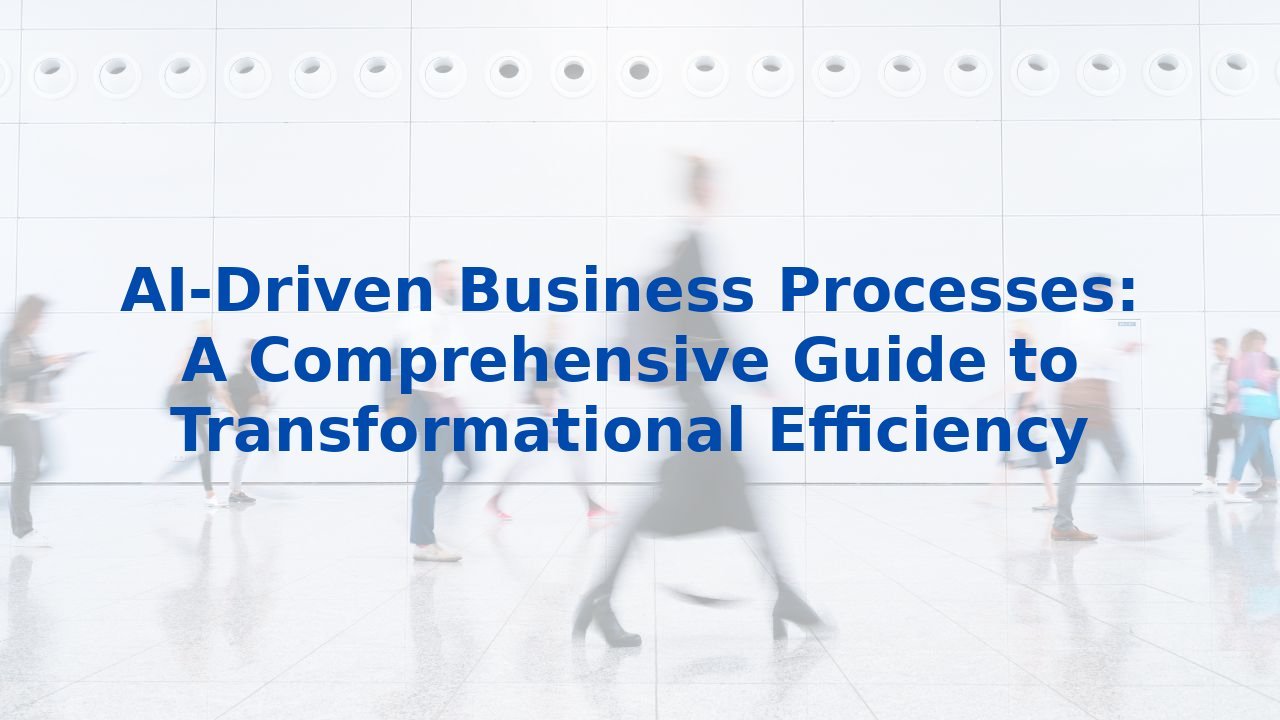AI-Driven Business Processes: A Comprehensive Guide to Transformational Efficiency
AI-Driven Business Processes: A Comprehensive Guide to Transformational Efficiency
Introduction
In a world where change is the only constant, businesses are in a relentless pursuit of ways to enhance efficiency, boost productivity, and maintain high-quality standards. Enter Artificial Intelligence (AI)—a game-changer that promises to revolutionize organizational operations. By embedding AI into core business processes, companies can streamline their workflows, empower better decision-making, and cement their competitive advantage. Let’s dive deep into how AI enhances business processes and its myriad benefits for efficiency.
Understanding Business Process Management (BPM)
Business Process Management (BPM) is about more than just managing workflows; it’s a systematic approach aimed at analyzing, designing, executing, and monitoring processes to achieve specific goals. The advent of AI has significantly transformed BPM, introducing new capabilities that elevate business processes from mere reactive measures to proactive strategies.
How AI Enhances BPM
AI is at the forefront of BPM transformation, offering several key advantages:
- Process Discovery: Utilizing process mining, pattern recognition, and natural language processing, AI can unearth existing processes, pinpointing inefficiencies and bottlenecks that might be invisible to the naked eye.
- Process Mapping: Through real-time data analysis, AI creates accurate process maps that keep documentation updated, ensuring a clear representation of workflows to facilitate optimization.
- Process Automation: With AI bots at the helm, organizations can automate monotonous tasks like data entry and customer service inquiries, ensuring both high accuracy and round-the-clock availability.
- Process Improvement: AI’s data-driven insights and predictive modeling empower organizations to achieve sustainable growth by highlighting risks and opportunities, allowing for informed decisions based on historical and real-time data.
Benefits of AI in BPM
Integrating AI into BPM isn't just a technological upgrade; it yields a plethora of benefits:
- Faster Decision-Making: AI processes structured and unstructured data, extracting critical information that illuminates patterns relevant to decision-making, enabling leaders to act swiftly and more effectively.
- Real-Time Monitoring: With the power of AI, processes can be monitored in real time, delivering current updates that allow businesses to intervene instantly, mitigating problems or capitalizing on opportunities.
- Predictive Analytics: Predictive capabilities allow businesses to foresee trends and potential issues before they escalate, fostering agility in responding to market fluctuations.
- Continuous Improvement: AI establishes a feedback loop that provides ongoing insights, encouraging organizations to iteratively optimize their processes, paving the way for long-term success.
Training Employees for AI
While AI is an invaluable asset, its influence can only be maximized with a skilled workforce ready to embrace the technology. Training employees is essential and brings numerous benefits:
- Enhanced Collaboration: Equipping employees with knowledge of AI tools fosters better collaboration with technology, making integration into existing workflows seamless and effective.
- Improved Decision-Making: With a firm understanding of AI algorithms, employees empower themselves to interpret insights and make informed decisions, enhancing both tactical and strategic outcomes.
- Adaptability: In the ever-evolving business landscape, a workforce trained in AI is inherently more adaptable, creating a competitive edge as the organization navigates new challenges and opportunities.
Practical Applications of AI in BPM
The real-world applications of AI within BPM are vast and transformative:
- Automating Routine Tasks: AI can take on menial tasks, such as document processing and data entry, that not only reduce errors but also liberate human employees for more strategic initiatives.
- Enhancing Sales and Marketing: By analyzing sales data, AI predicts customer behavior, unveiling upsell opportunities and automating administrative processes for personalized customer journeys.
- Improving Customer Service: AI-driven chatbots manage basic inquiries, whereas advanced systems analyze customer feedback, leading to improved service quality and a better customer experience.
- Optimizing Product Development: AI accelerates product development by generating design options based on given specifications, minimizing the time and cost typically needed for prototyping.
Conclusion
The path forward is clear: AI is not a fleeting trend; it's a cornerstone of modern efficiency that transforms business operations. By integrating AI into fundamental business processes—be it through process discovery, mapping, automation, or improvement—organizations position themselves for remarkable strides in productivity, quality, and overall performance. Furthermore, investing in employee training for AI ensures that businesses can fully harness these advantages. In a world that never stops evolving, embracing AI in BPM isn’t just a smart choice; it’s a necessity for staying ahead of the curve.
Explore extensive AI training programs and equip your workforce with the skills they need to ride the wave of change with confidence. Transform today for a stronger tomorrow.



